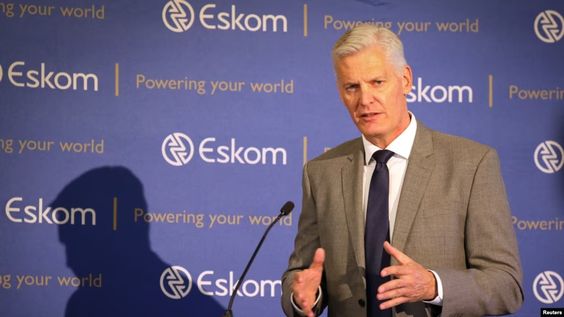Africa
CEO of South African power utility is ‘Released’ from his position

After charging high-level executives of wrongdoing, Eskom’s chief is resigning sooner than expected. Eskom is South Africa’s troubled state-run power provider. On the same day that South Africa’s finance minister announced a significant bailout for the indebted firm amid record power outages, the CEO announced his departure.
According to a statement made by Eskom on Thursday, CEO Andre de Ruyter has been “removed” from his position “with immediate effect.”
Late last year, De Ruyter offered his resignation, claiming he was powerless to save the corrupt utility. He claimed that shortly after, someone tried to poison him.
He was supposed to finish out his notice period until the end of March, but no replacement has been identified.
The announcement of his early departure came not long after de Ruyter delivered an explosive interview on Dutch TV this week, in which he accused senior cabinet members of knowing about and allowing corruption.
The board had a special meeting on Wednesday during which it was decided to shorten his notice time, according to Eskom spokesman Sikonathi Mantshantsha.
According to him, “the board additionally resolved that Mr. de Ruyter will not be compelled to spend the remaining time on his notice period but that he will be dismissed from his post with immediate effect.”
President Cyril Ramaphosa of South Africa declared a state of calamity earlier this month as a result of the electrical issue.
The “loadshedding” power cuts, which are supposed to relieve some of the strain on the overworked system caused by the frequent breakdowns of its numerous old and poorly maintained coal-fired power plants, are known as.
Blackouts, which can last up to 12 hours a day, have had a significant negative impact on Africa’s most industrialised economy, according to Finance Minister Enoch Godongwana, who spoke about the budget on Wednesday.
He followed up by announcing a hefty bailout for the $23 billion in debt firm.
READ ALSO: More Debt Relief for Africa is Advocated by UN Secretary-General Guterres
The main economic barrier, he claimed, is the absence of a consistent electrical supply. “Load shedding at record levels occurred in 2022. There were 207 days of load shedding, I’m told.
The government’s decision to reduce debt was a wise one, according to Lumkile Mondi, an economics expert at Witwatersrand University in Johannesburg.
“I think generally that is positive,” he added, “because it allows Eskom to utilise that money effectively, invest in new transmission facilities, while also having money to support some of the viable coal powered power units.”
According to independent expert Asanda Ngoasheng, there are numerous causes behind the current situation. Only a small portion of the population—primarily whites—had access to electricity during apartheid, so when South Africa became a democracy, the new administration had to provide electricity to the rest of the populace.
She described it as “really a heady concoction of ill infrastructure that wasn’t maintained, infrastructure that had to service more people than it had to before, and corruption, which then kind of made things worse than they previously were.”
De Ruyter was Eskom’s 13th CEO in the last ten years. The business has stated that a replacement is being sought.
VOA
